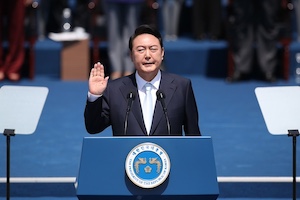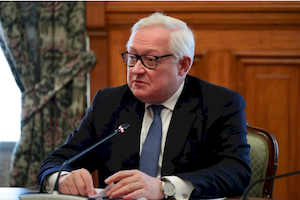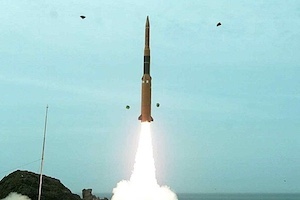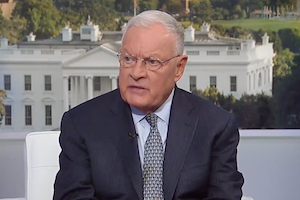World
Baltic Sea Cable Cuts Again, Finnish Government Launches Serious Investigation

In mid-November, an undersea communication cable connecting Finland and Germany across the Baltic Sea was reportedly damaged. Recently (on December 3), it was revealed that two breaks had occurred in the land-based fiber optic cable between Sweden and Finland, causing severe network outages in Finland. This marks the second cable-cutting incident within 20 days, prompting investigations by Finland's Ministry of Transport and Communications and the police.
The undersea cable damage in mid-November has heightened vigilance among Baltic Sea nations regarding cable disruptions. Swedish authorities suspect that the damage may have been intentional. Telecom operators suggest that one of the break points might have been caused by regular construction digging. While Sweden was not directly affected by the cable damage, Swedish Civil Defense Minister Carl-Oskar Bohlin stated that the Swedish government takes this event seriously and will continue to monitor its developments.
On November 17 and 18, two undersea fiber optic communication cables connecting Sweden with Lithuania and Finland with Germany were reportedly severed by the Chinese cargo ship "Yipeng No. 3." According to local digital infrastructure and data communication provider "GlobalConnect," on December 2, the land-based data cable linking Sweden and Finland was also damaged at two different locations in southern Finland, affecting up to 6,000 individual users and 100 business users. The Finnish government has expressed that it is taking the matter "seriously," though it has not yet moved towards a criminal investigation.
In response to the November mid-month undersea cable damage, with support from the European Union Agency for Criminal Justice Cooperation (EUROJUST), Finnish authorities are working alongside Sweden, Germany, and Lithuania to investigate. Germany has indicated that the damage seems to have been caused by "sabotage," although no evidence has been found yet. Last week, Sweden formally requested China’s cooperation in clarifying the situation.
The Baltic Sea is one of the most important shipping routes for global merchant vessels, accounting for 15% of the world's shipping traffic. The countries along the Baltic coast include Denmark, Sweden, Finland, Estonia, Latvia, Lithuania, Poland, and Germany, with the exception of Russia. All eight countries are members of the North Atlantic Treaty Organization (NATO). To strengthen protection of their internal infrastructure, a 12-day military exercise called "Cold Wind" was launched on November 18, involving 30 NATO warships and 4,000 military personnel. The scale of the exercise was exceptionally large.
Experts from the UK and the US have pointed out that due to the high density of ship traffic in the Baltic Sea, its shallow sea telecommunication cables, power lines, and natural gas pipelines are particularly vulnerable to damage. Cable disruptions are not uncommon. However, if these disruptions are confirmed to be state-sponsored sabotage, it could be a return to tactics last seen during World War I or the 1898 Spanish-American War.
- 98 reads
South Korean President Yoon Suk-yeol launches the shortest martial law in history, facing impeachment crisis

In response to growing domestic social discontent and waves of protests, South Korean President Yoon Suk-yeol unexpectedly announced the imposition of martial law on the evening of December 3. However, the martial law was lifted within hours after a majority vote in the National Assembly, making it the shortest in South Korean history. This decision quickly sparked strong reactions across society, becoming a hot topic nationwide and leading to intense debates. It also created a severe political crisis for the Yoon administration, which now faces the prospect of impeachment proceedings.
In April this year, during the National Assembly elections, the progressive Democratic Party (DP) easily secured a majority, while Yoon’s conservative People Power Party suffered a crushing defeat, leading to a "small ruling party, large opposition" situation. By November, Yoon’s approval rating had fallen below 20%, far below the over 50% it had been when he first took office.
Last week, the National Assembly voted to cut Yoon’s 2025 budget by $3 billion, aiming to curb the president’s power. The budget cuts directly targeted the Blue House, the National Prosecutor’s Office, and the police. In response, on the evening of December 3, Yoon suddenly declared a state of emergency, claiming it was to "protect the free Republic of Korea from the threat of North Korean communist forces" and to eliminate the pro-North Korea factions willing to use any means necessary.
However, this decision triggered significant backlash. Many citizens and political analysts considered Yoon’s move a severe challenge to the democratic system, accusing him of abusing his power and sidelining national security and citizens’ basic rights. South Korea’s opposition parties and human rights organizations quickly issued statements condemning the action, demanding the immediate reversal of the martial law order.
Ultimately, with all 190 members present in the National Assembly voting in favor, Yoon decided to rescind the martial law order that evening and issued an apology to the nation. Due to the widespread skepticism and dissatisfaction caused by the incident, the opposition parties immediately initiated impeachment proceedings against Yoon, accusing him of abusing presidential powers in an emergency situation and endangering the country’s democratic system and civil liberties.
- 112 reads
Biden Signs Pardon for Son Hunter, Citing Judicial Injustice

Despite U.S. President Joe Biden reiterating during the Thanksgiving ceremony that he would not pardon his second son, Hunter, before leaving office, on December 1, Biden signed an executive pardon, absolving Hunter of charges related to illegal firearm possession and tax evasion. Part of the reason was concern that even after Biden leaves office, his political opponents might continue to target Hunter.
Biden’s unexpected move to pardon his son drew criticism from the opposition Republican Party, which accused him of abusing presidential powers and interfering with the judicial system. Members of Biden’s own Democratic Party also voiced criticism, arguing that the decision could undermine public trust in the rule of law. Notably, Biden and the Democrats had previously criticized former President Donald Trump on similar grounds. Trump responded by calling Biden’s pardon another example of abuse of power and judicial injustice. White House Press Secretary Karine Jean-Pierre stated that Biden trusts the Department of Justice, even though Biden has previously claimed that his son’s legal proceedings were "politically motivated" and that Hunter was being unfairly targeted due to political factors.
Analysts believe this incident will have profound implications for Biden’s political career and could further exacerbate the polarization of U.S. politics. Hunter Biden’s future remains uncertain, as Republicans have vowed to continue investigating other potential illegal activities. Overall, Biden’s decision to issue a pardon for Hunter is not only a significant moment for his family but also a critical test for the U.S. political and judicial systems. How this event will unfold remains to be seen.
- Read more
- 146 reads
100,000 Desertions in Ukraine: Entire Units Vanish

According to data from Ukraine's Prosecutor General, over 100,000 deserters have been prosecuted since the outbreak of the Russo-Ukrainian war in February 2022. Reports suggest the number of deserters could now exceed 200,000. Many soldiers, after taking medical leave due to injuries, never return to the battlefield. Some refuse to obey orders following disputes with their commanders during combat, and entire units have reportedly abandoned their positions, leaving defense lines vulnerable to Russian advances. Kyiv military experts warn that the problem is likely to worsen.
Serhii Hnezdilov, a rare case of a soldier openly discussing his decision to desert, took medical leave for a hand surgery and decided never to return. He shares recurring nightmares of being under heavy fire: "Fifty shells come from the Russian side, and we respond with just one. I saw my comrades killed right before my eyes, realizing I might be next." He adds, "If there is no end date to service, it feels like imprisonment. Psychologically, it's hard to find a reason to defend the country."
According to three officers and a spokesperson for Ukraine's State Bureau of Investigation, prosecutors and military officials prefer not to charge deserters unless efforts to persuade them to return fail.
While Russia also faces issues with desertion, the widespread absence of Ukrainian soldiers highlights deep-rooted problems within its military and the challenges Kyiv faces in managing the war. These include flawed mobilization efforts, overextension, and the hollowing out of front-line units. The New York Post notes that a manpower shortage could disadvantage Ukraine in future peace negotiations. Meanwhile, U.S. officials have urged Kyiv to lower the conscription age from 25 to 18.
- Read more
- 167 reads
Russian Deputy Foreign Minister: Moscow Open to Resuming Nuclear Tests

Russian Deputy Foreign Minister Ryabkov recently stated in a public forum that Moscow is open to resuming nuclear tests, but only if the United States takes the lead in such actions. Should the U.S. initiate nuclear testing, Russia would immediately respond with equivalent measures. Ryabkov emphasized that Russia's stance is a reaction to the U.S.'s prolonged failure to ratify the Comprehensive Nuclear-Test-Ban Treaty (CTBT). Last year, Russia revoked its ratification of the treaty, with President Putin describing the move as a response to the West's "unreliable policies."
At the same time, Ryabkov stressed that Russia is willing to coordinate with other nuclear powers within the framework of the United Nations, particularly on issues related to arms control and international security. However, in recent years, tensions among nuclear-armed nations have significantly escalated due to the Russia-Ukraine conflict and Western sanctions against Moscow.
Overall, Moscow's adjustments to its nuclear policy reflect its response to changes in the global geopolitical landscape. This also serves as a clear warning to the West, demonstrating Russia's dual focus on reciprocal measures and international cooperation.
- 138 reads
South Korea Successfully Develops Indigenous Ground-to-Air Missile Defense System in Response to North Korea

The Agency for Defense Development (ADD) of South Korea announced on the 29th that it has successfully developed the Long-range Surface-to-Air Missile (L-SAM) defense system, marking a significant upgrade to the country’s missile defense capabilities. The system is expected to begin mass production in 2025 and is a response to North Korea's increasingly sophisticated missile threats.
The L-SAM project, which began in 2015, was developed entirely by South Korea using cutting-edge technology. It is estimated to have cost around 12 trillion Korean Won. The system features direct hit kill capabilities, a guidance and attitude control system (DACS), and infrared imaging (IIR), allowing it to destroy incoming missiles through kinetic energy.
The missile body is equipped with a two-stage booster, allowing it to respond to different threats, such as enemy aircraft or missiles. It can intercept missiles at altitudes of approximately 40 kilometers above the ground, during an enemy missile’s attack. Positioned as part of the upper-tier missile defense system, it is highly effective at reducing damage to the ground. Its interception capabilities are slightly lower than the THAAD system but still offer robust defense.
The South Korean military stated that the L-SAM will begin mass production in 2025, with plans to complete its deployment in the mid-to-late 2020s, addressing South Korea’s air defense gaps. Additionally, South Korea will actively work on developing improved versions (L-SAM-II) and long-range interception systems (LAMD) to expand the interception range and further enhance defense capabilities.
- 175 reads
Trump Appoints Kellogg as Russia-Ukraine Envoy to Initiate Peace Talks

U.S. President-elect Donald Trump announced that he will appoint retired Army Lieutenant General Keith Kellogg as a special assistant to the president and envoy for Russia-Ukraine negotiations in order to address the ongoing war. At 80 years old, Kellogg is known for his strong stance. He has previously suggested that the U.S. should demand Ukraine come to the negotiation table, warning that military aid would stop if Ukraine refuses, while also threatening Russia with "being destroyed" unless it agrees to participate in talks. Additionally, he has recommended that the U.S. focus on dealing with China rather than intervening in the Russia-Ukraine conflict.
One of Trump's campaign promises was to end the Russia-Ukraine war. In June of this year, Kellogg and Fred Fleitz, a former National Security Council staffer during Trump's previous administration, proposed a plan to end the war. They recommended delaying Ukraine's NATO membership as a condition to increase Russia's willingness to engage in negotiations. Kellogg has stated, "I don’t think World War III has started, but we are on the brink of war, and a small spark could ignite it uncontrollably." Kellogg shares similar views with Trump’s vice presidential nominee, James David Vance, believing that Ukraine should cede territory to Russia and reject NATO membership.
Politico, a U.S. political news outlet, pointed out that Trump might bypass Senate approval and directly appoint Kellogg as the "Special Envoy for Ukraine and Russia," similar to how John Podesta was appointed as the climate envoy. However, even if Kellogg's appointment requires Senate approval, it is expected to face little opposition, given the Republican majority in the Senate.
Kellogg has long been one of Trump's senior defense advisors and temporarily filled in for former National Security Advisor Michael Flynn after his resignation. Trump reiterated his support for Kellogg on his social media platform, Truth Social, stating, "He has fought alongside me from the very beginning!" "He has performed excellently in both his military and business careers, including serving in a critical and sensitive national security role during my first term." "Together, we will make America and the world safe again!"
- 140 reads
Israel and Hezbollah Reach Ceasefire Agreement, Troop Withdrawals to Create Buffer Zone in Southern Lebanon

Israel and the Lebanese militant group Hezbollah have reached a ceasefire agreement, which took effect at 4 a.m. on the 27th, offering a momentary respite from the ongoing conflict in the Middle East. Israel plans to withdraw its forces from southern Lebanon within 60 days, with the Lebanese army taking control of the region. Hezbollah's armed forces are also required to retreat from southern Lebanon, moving north of the Litani River. Israeli Prime Minister Benjamin Netanyahu stated that the focus of military operations will shift back to Gaza, targeting Hamas and addressing the threat from Iran.
U.S. President Joe Biden, speaking at a White House press conference, confirmed that the ceasefire agreement had been facilitated with the help of French President Emmanuel Macron, and that both sides had agreed to the U.S. proposal. The agreement aims to permanently end hostilities, allowing civilians on both sides to return home and begin rebuilding. According to CNN, following the ceasefire, Lebanese refugees who had fled their homes are starting to return to southern Lebanon. However, residents of northern Israel are skeptical about whether the ceasefire will lead to lasting peace, with many unwilling to return to their homes. Israeli security officials have stated that residents can decide for themselves when it is safe to return.
Netanyahu emphasized that Israel will adhere to the ceasefire agreement, but reserves the right to retaliate if Hezbollah violates the terms. Without Hezbollah's support, Hamas would be left to fight alone, and Israel will intensify its attacks against the group.
Lebanese data shows that since the outbreak of hostilities in October of last year, nearly 4,000 people in Lebanon have been killed, with the majority of casualties resulting from Israeli attacks over the past three months. According to the United Nations, more than 900,000 Lebanese have been displaced by the conflict, and the economic losses are estimated to exceed $8.5 billion.
- 118 reads
Australia Plans to Legislate Ban on Social Media Use for Children Under 16

On the 27th, the Australian House of Representatives passed a bill, the *Online Safety Amendment Bill*, with 102 votes in favor and 13 against. The bill proposes to ban children under 16 from using social media platforms. The Senate is expected to vote on the bill later this week, and if it passes, Australia will become the first country in the world to implement age restrictions on social media use.
The ban will apply to major global social media platforms, including TikTok, Facebook, X, Snapchat, Instagram, and others. These platforms will have one year to comply with the new rules. Systematic violations could result in fines of up to 50 million AUD.
According to reports, social media platforms have expressed concerns over the Australian government's bill, arguing that the ban on children under 16 using social media was rushed. The platforms were only given 24 hours to submit feedback, and there was a lack of thorough consultation and detailed planning. Additionally, critics argue that the ban could negatively impact children's freedom of speech and access to information.
Australia has been a pioneer in regulating social media, and this bill's proposed age restriction will be one of the strictest child protection measures globally. The draft law also includes strong privacy provisions, requiring tech platforms to delete all age verification data.
Led by Prime Minister Anthony Albanese, the center-left Labor government hopes to pass the bill this week, aiming to get it through Parliament before the end of the year recess. The bill has garnered support from the opposition Liberal Party and is expected to pass smoothly.
- 127 reads
Trump Jr. Replaces Ivanka in Personnel Decision-Making Authority

Donald Trump Jr. Gains Key Influence Over Cabinet Appointments, Replacing Ivanka as the Family’s Most Influential Advisor. Donald Trump Jr., the eldest son of U.S. President-elect Donald Trump, has gained significant influence in shaping the new administration’s cabinet appointments. His selections often favor loyalists with limited experience rather than seasoned professionals for high-ranking government positions. Controversial appointments include Robert F. Kennedy Jr. and Tulsi Gabbard, alongside his opposition to Mike Pompeo, known as "the most pro-Taiwan Secretary of State," joining the administration. Trump Jr. has effectively replaced his sister Ivanka as the family’s most influential advisor.
Reports indicate that Trump, who has long relied on family members for counsel, is now heavily influenced by his eldest son in forming his cabinet. Among Trump Jr.’s key recommendations is his friend J.D. Vance, whose anti-corporate rhetoric, opposition to aid for Ukraine, and controversial remarks about women had alienated some donors and supporters. Despite this, Vance ultimately gained Trump’s favor and emerged as a vice-presidential contender. Trump Jr.’s preferences lean toward anti-establishment figures, advocating for policies such as protectionist economics, reduced military interventions, and cuts to foreign aid, ensuring loyalty to Trump within the administration.
Trump Jr. is also expected to join the conservative venture capital firm 1789 Capital while continuing to host a political podcast that serves as a platform for Trump’s political messaging. However, he is unlikely to engage in routine government affairs after Trump assumes the presidency.
Meanwhile, other family members, including Trump’s son-in-law Jared Kushner, daughter Ivanka Trump, and second son Eric Trump, are not expected to join the new administration. Kushner is anticipated to play an unofficial role in Middle East policy, building on the "Abraham Accords" he facilitated in 2020 to normalize relations between Israel and Arab nations, with potential efforts to strengthen ties between Israel and Saudi Arabia. Sources suggest that with Susie Wiles, the disciplined White House Chief of Staff nominee, assisting in streamlining operations, Trump’s reliance on family input is significantly diminished.
- Read more
- 151 reads
Human Rights
Fostering a More Humane World: The 28th Eurasian Economic Summi

Conscience, Hope, and Action: Keys to Global Peace and Sustainability

Ringing FOWPAL’s Peace Bell for the World:Nobel Peace Prize Laureates’ Visions and Actions

Protecting the World’s Cultural Diversity for a Sustainable Future

Puppet Show I International Friendship Day 2020

